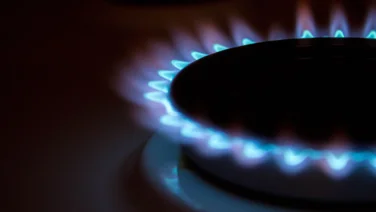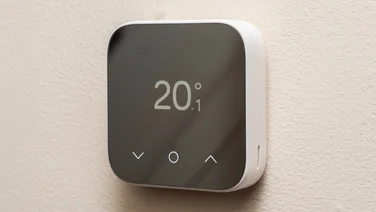To help us provide you with free impartial advice, we may earn a commission if you buy through links on our site. Learn more
- Get a free solar panel installation quote today
- What is a solar battery?
- How is solar battery size measured?
- What size solar storage battery do I need?
- Do I need a bigger solar battery if I have more solar panels?
- What size solar battery do I need to run an electric car?
- How much does solar battery storage cost?
- Is solar battery storage worth it in the UK?

Solar panels are brilliant at generating electricity, but they can’t store it for using after the sun goes down. That means if you use most of your electricity after dark, you’re not getting the best out of your solar investment. But there’s an easy fix: add a solar battery, so you can store electricity in it and draw from it day and night.
Solar storage batteries come in a range of capacities, and it’s important to buy the right size. This isn’t just because the battery needs to be big enough to cover your household’s energy needs, but its capacity also needs to fit the amount of electricity your solar panels produce each day.
In this article we’ll reveal what sizes solar batteries come in, and help you work out which size battery will store all the electricity needed to run your home. We’ll also look at how much it’s likely to cost you.
Get a free solar panel installation quote today
To get a tailored estimate of which size solar PV system and battery you need, fill in our quick form below and we’ll put our trusted suppliers in touch.READ NEXT: Pigeon-proofing solar panels
What is a solar battery?
A solar battery, or battery energy storage system (BESS), is a device that lets you store energy from your solar PV system and then use it when you need to. (PV stands for “photovoltaics” and a PV system generates power using devices that absorb energy from sunlight and convert it to electrical energy aka “solar power”.)If you don’t have a solar battery but use nearly all your electricity after dark, much of that electricity will need to come from the National Grid, rather than from your panels. Most of your own generated energy would go to waste (well, donated to the grid). So a solar battery enables you to use far more of the electricity your panels generate.
How is solar battery size measured?
All types of battery are measured by their capacity to store electricity. Most solar storage batteries designed for home use have a capacity of between 1kW and 13kW (kilowatts), and prices go up roughly in line with capacity. Many new battery systems are modular, so you can start with smaller (and more affordable) capacity batteries and then add more as needed. More on prices in a moment.
Bear in mind that headline battery capacity doesn’t tell the whole story. Three other measures are key when choosing your ideal battery size:
Usable capacity: This is the amount of stored energy that you can actually use, after the small amount (usually 5-10%) used by the battery while charging and discharging. As we explain above, you’re unlikely to need more than 10kW unless you also run an electric vehicle or two, or your power goes down for days. Also bear in mind that very large-capacity batteries tend to be physically big, so you’ll need to find the space.
Depth of discharge (DoD): This effectively means the amount of total capacity that’s usable. If a battery has a 100% DoD, then 100% of its total capacity is usable. That’s rare, but many of the best solar batteries advertise a DoD of over 90%.
Power output: This measures the amount of stored electricity a battery can discharge at once. If you need to power multiple high-drain devices simultaneously when you get home from work – for example the kettle, a fan heater and a tumble dryer – then you will need a battery that can handle a high power output. Be aware that high power outputs wear out a battery much faster than low power outputs.
READ NEXT: Best solar battery storage UK
What size solar storage battery do I need?
When sizing up your ideal battery, the main deciding factor is the amount of electricity you use, particularly after dark. If your household has very high energy requirements in the evenings, especially during longer winter nights, smaller battery storage systems may not have the capacity to cover your needs.
That’s not the end of the world, because any shortfall will be seamlessly covered from the grid. But a larger battery would be a better investment, because it would enable you to meet all your electricity needs by yourself using free solar energy.
A professional provider can work with you to determine the pattern of your electricity usage, then use that to calculate your ideal solar PV system and battery. For an estimate, check your smart meter to see how much electricity you use on average in 24 hours. If it’s 8kWh (kilowatt hours, the unit measure of electricity usage), your ideal solar battery would be 8kW.
Here’s a rough guide to the usage and battery size needs of different size households:
| Household | Daily electricity usage | Battery size needed |
| 1-2 occupants | 4.9kWh | 4-5kW |
| 2-3 occupants | 7.9kWh | 7-8kW |
| 4-5 occupants | 11.8kWh | 10-12kW |
[Source, via Ofgem’s annual figures]
Domestic solar batteries range in capacity from around 1kW up to as much as 16kW, so you’re bound to find a battery to meet your needs.
READ NEXT: Best solar power banks and chargers
Do I need a bigger solar battery if I have more solar panels?
Yes, but not too big. The battery must be small enough to be fully charged by your solar panels regularly. Don’t buy a solar battery that’s more than double (in kW) the size of your solar PV system, because your panels won’t be able to fill it to capacity. This can lead to chronic under-charging, which will damage the battery.
If you have a 3.5kW solar PV system of ten standard 350W panels, you’ll need a solar battery no larger than about 7kW. This is the average amount of electricity a UK household uses in a day, so you’re unlikely to need a battery any bigger unless you want to charge an electric vehicle.
READ NEXT: Solar panels for sheds
What size solar battery do I need to run an electric car?
The UK Department of Transport reported in 2020 that the average driver in England travels 4,334 miles a year or 12 miles a day. A home charger for an electric vehicle (EV) covering these miles would use around 3.6kWh per day, 108kWh per month and 1,296kWh per year.
This usage can be covered by a domestic solar battery, provided it’s a ‘DC-coupled’ battery that supports EV charging. You would also need to ensure that you have enough electricity left over to power your home, and that your solar PV system is large enough to charge the battery fully.
Speak to a solar installer to calculate the size of the solar PV system and battery you’ll need to run your EV and home.

How much does solar battery storage cost?
The average price of a solar battery in the UK is currently about £4,500 including installation. It’s rare to find a solar battery for less than £2,000, and high-end models can cost as much as £10,000. It usually costs less to have the battery installed at the same time as your solar PV system, rather than later on.
Solar batteries typically come with a 10-year warranty, and a battery’s useful life is about half that of a solar PV system. So you will probably need to buy two batteries during your system’s lifespan.
READ NEXT: Cheap solar panels
Is solar battery storage worth it in the UK?
Absolutely yes. Our dark winters and rainy summers can make it hard to power a household using solar panels, no matter how good the solar PV system is. It’s very common for people to only be at home when it’s dark during autumn and winter. So a solar battery is arguably an essential part of a solar PV system in the UK.
Of course, £4,500 is a lot of money to spend upfront. However, a solar battery is a superb investment because it helps you use far more of the electricity that your panels produce, and can dramatically cut your energy bills.
If your electricity bill is about £2,000 per year and your solar battery enables you to cover all your electricity needs with solar, then your battery will pay for itself in just a couple of years. It will also reduce the number of years your solar panels will take to pay for themselves.
To find out more about what size battery and solar PV system your home needs to set yourself free from electricity bills, fill in our quick form above, and we’ll ask our hand-picked local providers to get in touch.






